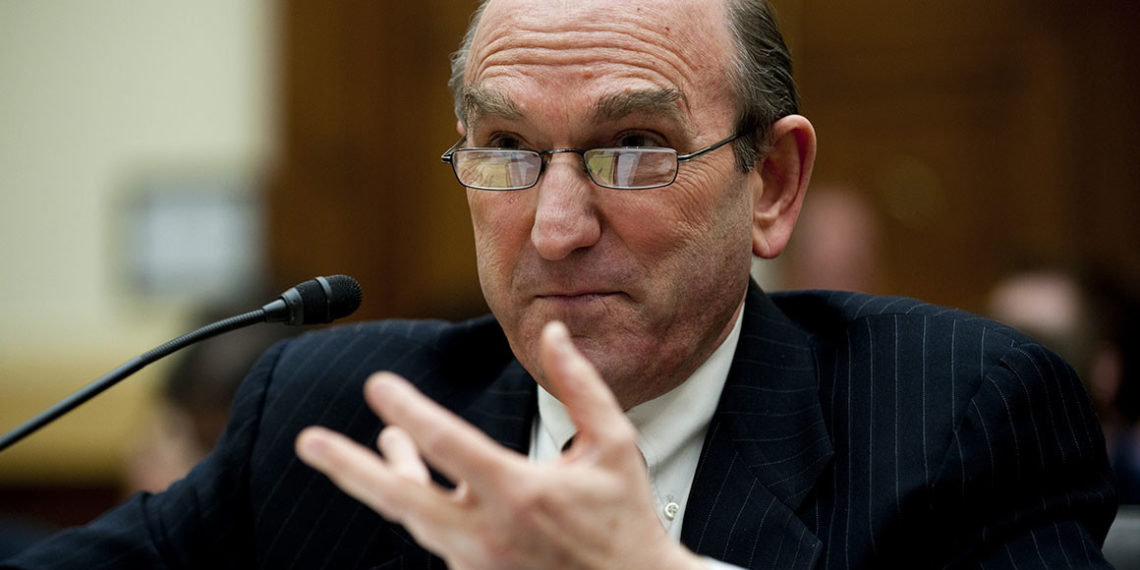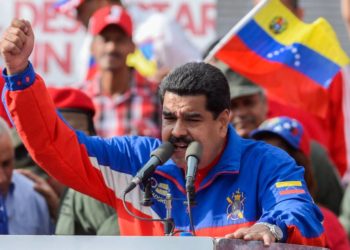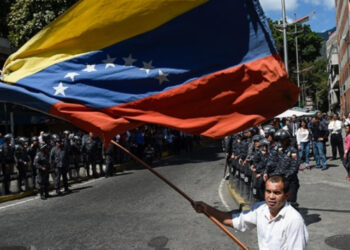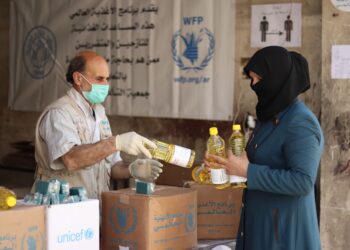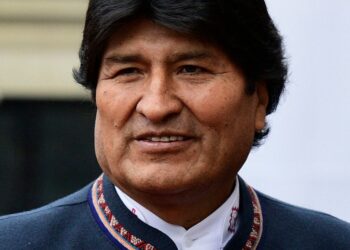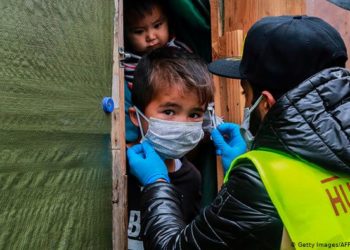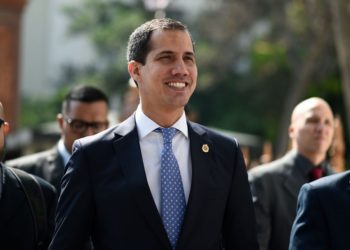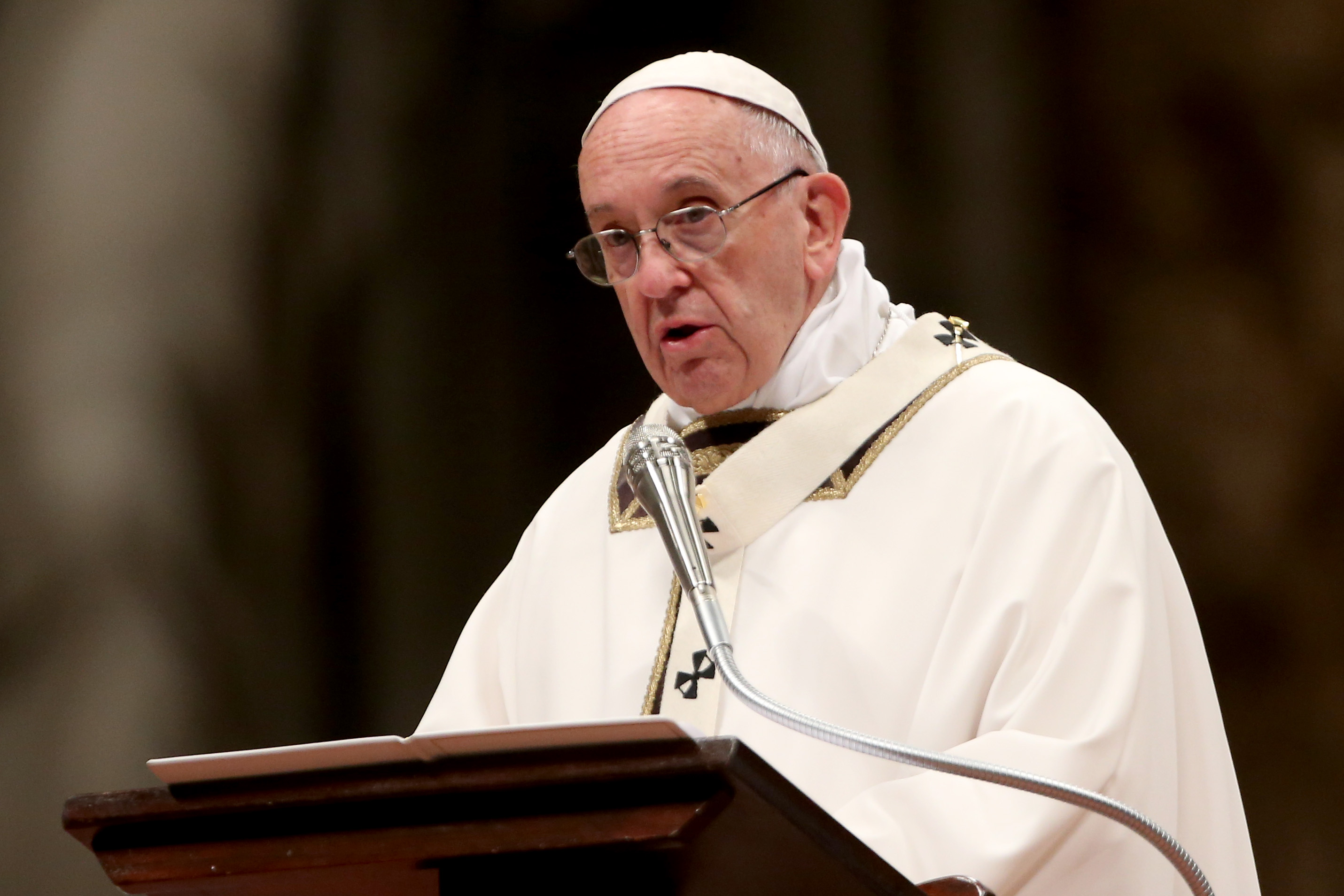The U.S. State Department announced on Thursday that Special Envoy Elliott Abrams will travel via military aircraft to the Colombian border with Venezuela as tensions over the country’s political crisis and the blocking of aid shipments continue to escalate.
On Friday, two people were reportedly killed and 15 were wounded by Venezuelan troops enforcing a blockade on the border with Brazil, which was ordered closed by embattled President Nicolas Maduro on Thursday.
“An indigenous woman and her husband were killed and at least 15 other members of the Pemon indigenous community were injured,” the human rights group Kape Kape reported.
Venezuela has been embroiled in a political crisis since National Assembly leader Juan Guaido of the right-wing opposition party National Will declared himself interim president on January 24, arguing Maduro’s 2018 re-election victory was illegitimate. Guaido was not himself a candidate in the election, which was boycotted by the country’s leading opposition groups.
U.S. President Donald Trump swiftly recognized Guaido as the interim-president in an apparently coordinated effort to oust Maduro, the handpicked successor to the late leftist President Hugo Chavez.
The Border Dispute
The State Department said in a statement that Abrams will lead a U.S. government delegation “to accompany humanitarian supplies to be transported from Florida to Colombia by military aircraft.”
Abrams will also be accompanied by Vice President Mike Pence on the trip.
Watch Juan Guaido declares himself interim president of Venezuela https://t.co/ShnX8fTVLE pic.twitter.com/8qQoYIR5bG
— Los Angeles Times (@latimes) January 24, 2019
U.S. officials have slammed Maduro for blocking American aid shipments from entering Venezuela as the country continues to face food and medicine shortages and cases of malnutrition caused by the country’s severe economic crisis, which has reportedly caused more than three million people to leave the country in recent years.
The United Nations and the Red Cross, however, have said the U.S. aid shipments are “politically motivated” and have refused to participate in efforts to bring the aid into Venezuela.
“We will not be participating in what is, for us, not humanitarian aid,” Colombia’s International Red Cross spokesperson, Christoph Harnisch, said earlier this month.
While Maduro remains committed to rejecting shipments from the U.S. relief agency – USAID – aid from various other international agencies has been allowed into the country.
A Dark History
Maduro contents that the U.S. aid shipments are really intended as a Trojan horse to establish a pretext for military action to overthrow his government, a course of action that Trump administration officials have said is not off the table.
Writing in The Conversation U.S., American University Political Scientist Morten Wendelbo noted that “history does give Maduro reasons to be skeptical of U.S. intentions.”
Rep. Ilhan Omar grilled Elliot Abrams about his comments on the U.S. role in El Salvador during El Mozote.
Here's what you need to know about the largest massacre in recent Latin American history, one that Abrams has previously downplayed. pic.twitter.com/Sk0UTpc3pf
— AJ+ (@ajplus) February 13, 2019
While serving as an official in the Ronald Reagan administration, Abrams was closely involved in the infamous Iran-Contra affair, when the administration illegally smuggled arms to the right-wing Contra group in Nicaragua, using the cover of humanitarian aid in the process.
The appointment of Abrams, who was convicted of two counts of perjury for lying to Congress about the arming of the Contras, has drawn intense criticism from many in the more progressive wing of the Democratic Party.
Last week, Abrams was grilled by freshman Congresswoman Ilhan Omar during a House Foreign Affairs Committee hearing about his role in helping to cover up a brutal massacre committed by U.S.-backed forces in El Mozote, El Salvador in 1981.
A Country, Divided
Venezuela itself remains bitterly divided over the ongoing crisis. Friday’s shooting near the Brazilian border occurred as thousands of people, many waving Venezuelan flags, flocked to the Venezuela-Colombia border for a charity concert in support of humanitarian aid deliveries in defiance of Maduro’s blockade.
Tens of thousands of Venezuelans have also taken to the streets in mass-demonstrations in recent months calling for Maduro’s departure as the country sinks deeper into economic despair.
Still, Maduro enjoys at least the tentative support of a significant portion of the population, most of whom represent the base of the Bolivarian movement that was championed by Chavez and is aimed at alleviating inequality and asserting the country’s economic and political sovereignty.
On February 10, thousands of Venezuelans in Caracas, many of whom waited in line for hours, signed a declaration denouncing the U.S. effort to oust Maduro.
“Please put in your picture that we’re not invisible and not being paid,” one Venezuelan man told U.S. journalist Max Blumenthal while waiting in line to sign the decree.
Many supporters of the Bolivarian movement have nonetheless been critical of Maduro, even as they object to what they see as American intervention in their domestic affairs.
In an interview on January 30, former Chavez advisor Eva Golinger, who knows Maduro personally, told The Globe Post she’s been disappointed by Maduro’s tenure as president, citing his authoritarian tendencies and high levels of corruption within his administration.
Golinger also said she believes the president’s mismanagement and incompetence are most to blame for the country’s economic woes but said ever-mounting U.S. sanctions have served to significantly exacerbate the crisis.
Crippled Economy
Following the U.S. recognition of Guaido, the Trump administration imposed additional sanctions on Venezuela’s state oil company, Pedevesa, which Gollinger said will have “a crippling effect on the economy.”
Blasting the U.S. efforts to bring aid into the country, Venezuelan Foreign Minister Jorge Arreaza highlighted the role the sanctions have played in harming the Venezuelan people.
“The U.S. has blocked our economy,” he said. “The cost of this blockade is over $30 billion — and they are sending this so-called humanitarian aid for $20 million. So what is this? I’m choking you, I’m killing you, and then I’m giving you a cookie?”
The Venezuelan military remains under the control of Maduro at this time, and the president has made clear that he does not intend to vacate the office without a fight.
As the U.S. and a host of aligned countries in the region and Europe are calling for Maduro’s immediate ouster, the United Nations, Mexico, and Bolivia are calling for dialogue and a de-escalation of tensions.
More on the Subject
Eva Golinger is an American attorney and journalist who was a legal advisor to former Venezuelan president Hugo Chavez. She’s also the author of the best-selling book, “Confidante of ‘Tyrants:’ The Story of the American Woman Trusted by the U.S.’s Biggest Enemies,” which documents her political work in Venezuela and her rise into the close circle of the country’s late president.
“I had breakfast with Hugo Chavez, lunch with Bashar al Assad, cocktails with Putin and dinner with Gaddafi. Fidel Castro sent me flowers, perfume and cigars. Ahmadinejad told me he loved me. Chavez proclaimed me his defender,” she writes.
Golinger sat down with The Globe Post to discuss the unraveling political crisis in Venezuela and the Trump administration’s efforts to overthrow the government of Nicolas Maduro.


